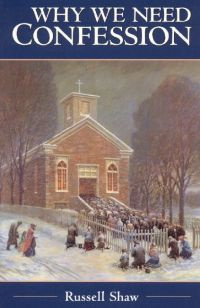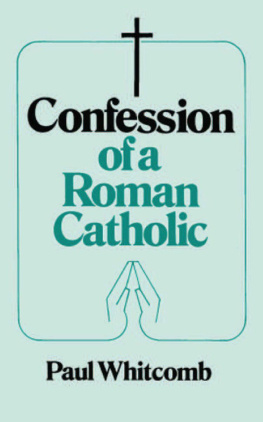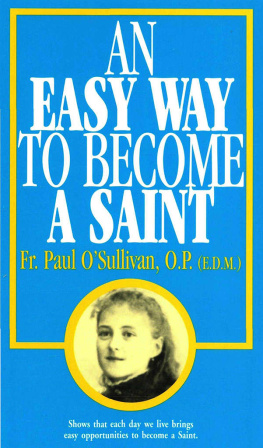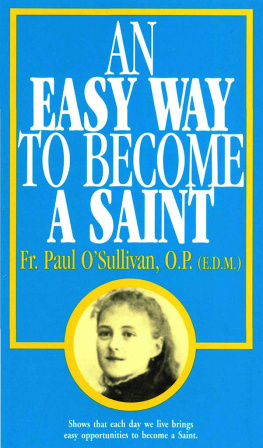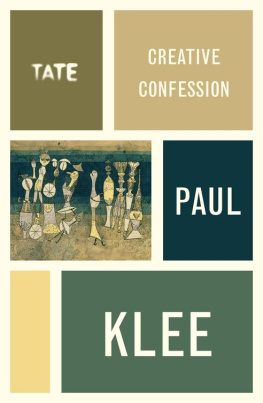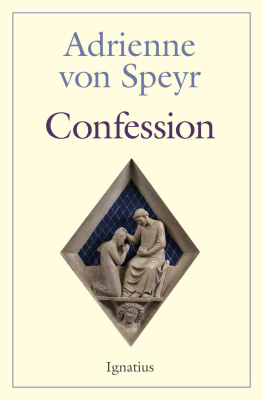Fr Paul OSullivan O.P. - The Secret of Confession
Here you can read online Fr Paul OSullivan O.P. - The Secret of Confession full text of the book (entire story) in english for free. Download pdf and epub, get meaning, cover and reviews about this ebook. year: 2009, publisher: TAN Books, genre: Religion. Description of the work, (preface) as well as reviews are available. Best literature library LitArk.com created for fans of good reading and offers a wide selection of genres:
Romance novel
Science fiction
Adventure
Detective
Science
History
Home and family
Prose
Art
Politics
Computer
Non-fiction
Religion
Business
Children
Humor
Choose a favorite category and find really read worthwhile books. Enjoy immersion in the world of imagination, feel the emotions of the characters or learn something new for yourself, make an fascinating discovery.

- Book:The Secret of Confession
- Author:
- Publisher:TAN Books
- Genre:
- Year:2009
- Rating:3 / 5
- Favourites:Add to favourites
- Your mark:
- 60
- 1
- 2
- 3
- 4
- 5
The Secret of Confession: summary, description and annotation
We offer to read an annotation, description, summary or preface (depends on what the author of the book "The Secret of Confession" wrote himself). If you haven't found the necessary information about the book — write in the comments, we will try to find it.
The Secret of Confession — read online for free the complete book (whole text) full work
Below is the text of the book, divided by pages. System saving the place of the last page read, allows you to conveniently read the book "The Secret of Confession" online for free, without having to search again every time where you left off. Put a bookmark, and you can go to the page where you finished reading at any time.
Font size:
Interval:
Bookmark:
BOOKS BY
FATHER PAUL OSULLIVAN, O.P.
HOW TO BE HAPPYHOW TO BE HOLY
ALL ABOUT THE ANGELS
AN EASY WAY TO BECOME A SAINT
THE HOLY GHOSTOUR GREATEST FRIEND
READ ME OR RUE IT
HOW TO AVOID PURGATORY

CUM PERMISSU SUPERIORUM.
| Imprimatur: | Can. Emmanuel Anaquim, V.G. Lisbon October 15, 1936 |
First published around 1936 by Edies do Corpo Santo, Lisbon, Portugal. Retypeset and reprinted in 1992 by TAN Books and Publishers, Inc., with permission of Saint Martin de Porres Apostolate, Dublin, Ireland. Retypeset and reprinted again in 2010 by Saint Benedict Press, TAN Books, with permission of Saint Martin de Porres Apostolate, Dublin, Ireland.
The type in this book is the property of TAN Books, and may not be reproduced, in whole or in part, without written permission from the publisher.
ISBN: 978-0-89555-459-8
Library of Congress Catalog Card No.: 92-61255
Printed and bound in the United States of America.
TAN Books
Charlotte, North Carolina
2010
The writer has conferred with many
experienced confessors,
and all, without exception,
agree that no vice is so gross,
so deep-rooted, so vicious
that it will not yield
to frequent Confession
()
NUNCIATURE APOSTLIGA
EM PORTUGAL
9 April 1943
Dear Father OSullivan,
I approve most heartily of your booklet on Confession. It supplies a need much felt, viz., a clear and practical explanation of the strength and consolation which Confession gives to the faithful.
You rightly emphasize the fact that Confession does not only pardon sin but that it efficaciously helps the greatest sinners to sin no more; it gives the weakest strength and consoles the most abandoned, if only they confess frequently.
You touch on points which are little understood, even by many Catholics, and your book will afford most interesting and useful reading, not only to Catholics, but also for those who do not be long to the Church.
Every chapter has an attractive title and grips the attention.
I have no doubt that the book will throw new light on the minds of many regarding the great Sacrament of Confession and exercise a beneficent influence even on non-Catholics.
With best wishes for the success of your book and with my cordial benediction,
 P. CIRIACI, Apostolic Nuncio
P. CIRIACI, Apostolic Nuncio
Contents
Part I
THE SECRET OF CONFESSION
Part II
THE WONDERS OF CONFESSION
Part I
THE SECRET OF CONFESSION
Including
Confession Was Instituted by Christ
What Protestants Think of Confession
Facts Are Stubborn Arguments
Why Does God Oblige Us to Confess?
All Men Need a Friend
The Choice of a Confessor
Chapter 1
WAS CONFESSION INTRODUCED BY A BISHOP?
At a fashionable reception in the metropolis [of Lisbon], a party of well-known Catholics was gathered together to pass a social evening.
Just as a distinguished foreigner was addressing a group of ladies and gentlemen, a friend of mine entered the room and overheard the following remark:
Excuse me, Madam, said the stranger, I did not exactly say that Confession was bad or evil, nor did I wish to imply that it was useless. I merely said that it was all very well for ladies, who, doubt less, find it very consoling to be able to unburden their consciences to a priest. But we men do not require such consolations!
The lady thus addressed quickly replied: And pray, Sir, how can men consider themselves dispensed from a law which was established for all? Dont men also have souls to save, and are they not, too, obliged to obey the commands of God?
The stranger continued: My dear Lady, the idea that Confession was instituted by God is an illusion. It was not God who instituted Confession; it is a purely human invention. Where do we find mention of it in the first ages of Christianity? If it were of divine origin, of course the obligation to confess would also fall on us. Confession was, as a matter of fact, instituted and introduced first in Germany, in the fourteenth century, by Bishop Fuller. And the stranger supplied, with the utmost effrontery, names of places, dates, and facts entirely fantastic.
On hearing this, the listeners were aghast. Some made attempts to defend the doctrine of the Church, but none of them was sufficiently grounded in his or her religion to be able to refute with authority the falsehoods of the distinguished guest.
On the following day, the friend who had witnessed the above incident called on me and, regretfully admitting his inability to disprove the strangers statements, asked for full enlightenment on the matter.
Now it seems to me that many Catholics, if they found themselves in like circumstances, would experience the same difficulty. True, they have a certain vague knowledge that Confession was instituted by Our Lord and practiced from the earliest times, but were they asked for a proof, they, like the Catholics just mentioned, could not give a reason for their faith. Still less could they explainif challenged by a Protestant or unbelieverthe sublime beauty, the divine efficacy, the splendid results and the immense consolations of Confession. And least of all could they answer the many difficulties so frequently urged against this great Sacrament.
To supply what we consider a great want, we venture to offer the public the following little work, which while showing that Confession was indeed instituted by Christ, will also show what a source of deep consolation and strength it is to those who understand it. Many Catholics never grasp the true idea of Confession, and some even find it a very painful and disagreeable duty.
Protestants, as a rule, find the idea repugnant, but strange to say, many among them, when once they hear it explained, feel a positive need of it, and it not infrequently hastens their entrance into the Catholic Church.
We flatter ourselves that both Catholics and Protestants will read our little book with keen interest and derive not a little profit from its perusal. It is popular in style and stresses several points of importance. The method is simple but attractive, and the reader becomes so engrossed that he is reluctant to put the book down until he has read the last page.
One of the special features of the little work is that it shows what an infinite source of consolation and help Confession is to the sorrowful and weak and what a powerful means it is of snatching boys and girls from the brink of some hidden danger. It also proves that, far from robbing a man of his manlinessas a distinguished Protestant statesman has rashly assertedauricular Confession makes a man a brave soldier, a loyal citizen and a trusty friend.
The term auricular refers to Confession made privately and heard by a priest. Editor, 1992.
Chapter 2
CONFESSION WAS INSTITUTED BY CHRIST
The Son of God came on earth to save man. From what? Clearly from sin and its consequences. All Christ did when on earththe sublime les sons He taught, the admirable doctrine which He bequeathed us, the Sacraments He instituted, the miracles He worked, the law He promulgated, His precepts and counsels all were destined for the great end of saving man from sin.
The 33 years Our Lord passed with us here below, His cruel sufferings, the Precious Blood He shed, and His death on Calvary had for their one great aim to purge the world of sin. Had He not achieved that end, His mission would have been a failure.
It was for this object that He came. He loved sinners, lived with them and called them to Him self. One of them, Peter , a weak and sinful man, He made the head of His Church. Paul , a fierce and relentless persecutor, He made the Apostle of the Gentiles and a vessel of election. Magdalen , an erring, sinful woman, the scandal of the city in which she lived, He chose for His special friend, made her a model for penitents, and eventually associated her with His Immaculate Mother.
Next pageFont size:
Interval:
Bookmark:
Similar books «The Secret of Confession»
Look at similar books to The Secret of Confession. We have selected literature similar in name and meaning in the hope of providing readers with more options to find new, interesting, not yet read works.
Discussion, reviews of the book The Secret of Confession and just readers' own opinions. Leave your comments, write what you think about the work, its meaning or the main characters. Specify what exactly you liked and what you didn't like, and why you think so.

